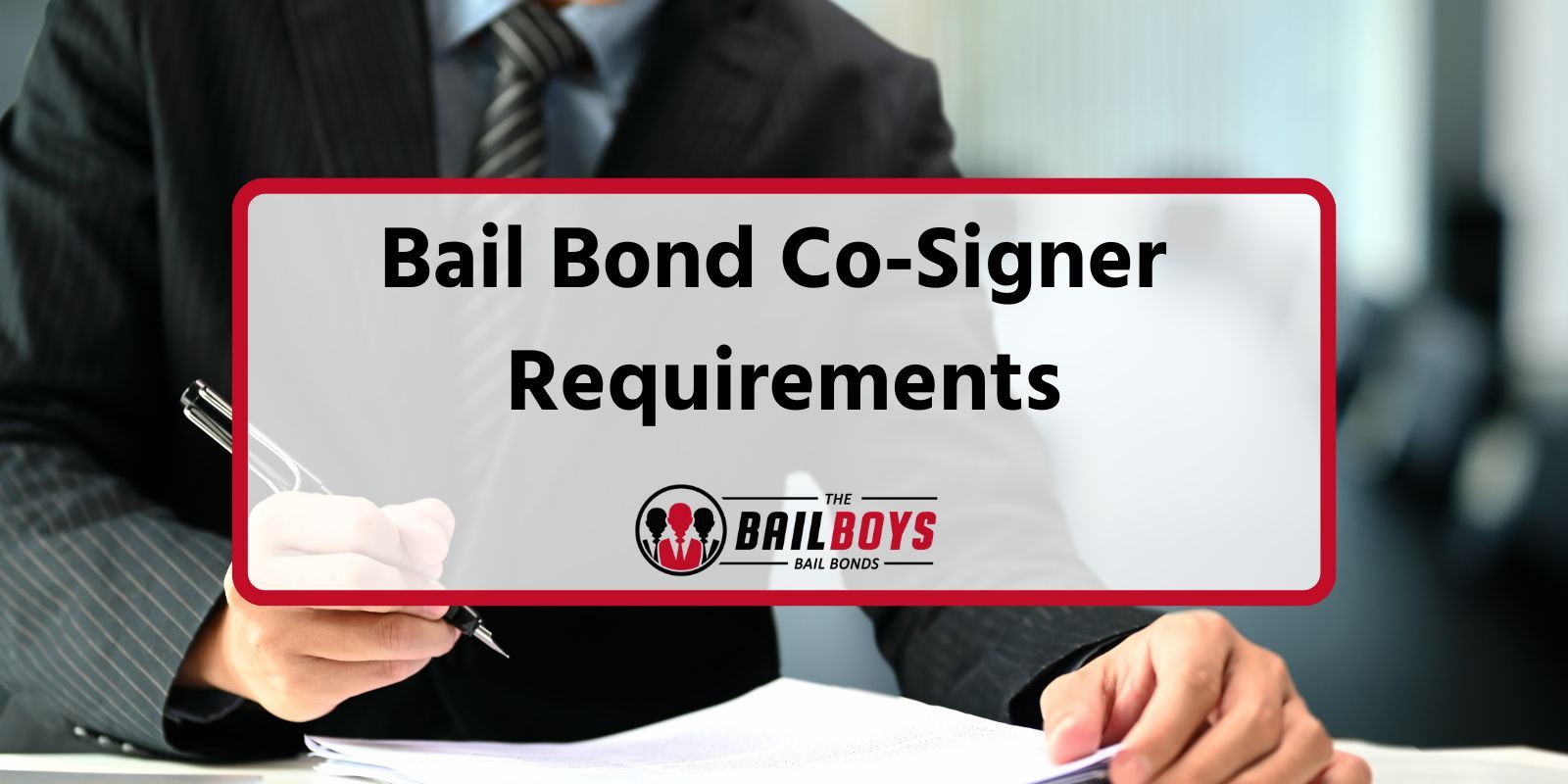
Bail Bond Co-Signer Requirements
A bail bond is a legal provision that allows the defendant to pay a set amount to secure their freedom from jail through a reliable bail bond company. The primary purpose of bail is to guarantee that the defendant will show up for their court dates.
To sign up for a bail bond, the defendant would need a cosigner. The specific requirements for bail bond co-signers varies based on jurisdiction and the policies of the bail bond company involved. However, there are some common requirements and considerations that are often applicable.
If you are attempting to bail a loved one out of jail and you want to understand the bail process and what it takes to cosign a bail, schedule a consultation with our bail experts at The Bail Boys for proper guidance and expert bail bond services.
In this article, we will be taking you through the requirements and responsibilities that qualify a person to co-sign bail bonds and other things you need to know about finding a cosigner.
Who is a Bail Bond Co-Signer?
A bail bond co-signer, also known as an indemnitor, is an individual who agrees to take financial responsibility for a defendant who has been granted bail. When a person is arrested and charged with a crime, they may have the option to be released from custody before their trial by posting bail. Bail is a financial guarantee that the defendant will appear in court as required.
If the defendant or their family cannot pay the full bail amount, they may seek the services of a bail bond company. The bail bond company, in turn, requires a co-signer to help secure the bond. The co-signer is typically a friend or family member of the defendant. Their role is to provide a guarantee to the bail bondsman that the defendant will appear on every required court date and adheres to other bail conditions.
Basic Requirements of a Co-Signer in California
Not everyone qualifies as a co-signer. Certain factors, such as age, financial and credit status, relation with the defendant, etc., are significant requirements of a cosigner. Let’s explore some California Law co signer requirement below.
Financial Stability
The financial stability of a cosigner proves his ability to cater to the charges associated with the bail bond. The court expects the cosigner to have a steady job with a certain income. This is to ensure that the co-signer has the financial means to cover the bail amount if the defendant fails to appear on scheduled court dates.
The court verifies the financial stability of the cosigner by requesting proof of his financial status, such as their credit cards, paychecks, payment history, etc.
Verifiable Identity
The co-signer must provide valid government-issued identification, such as a driver’s license or passport. They may also provide their residential address and other relevant details so he is easily accessible whenever needed.
Trustworthiness And Reliability
Since a cosigner acts as a guarantor to the defendant, they should have a good record or reports of reliability and faithfulness. For instance, it may be difficult to trust a cosigner with a bad criminal record or financial history.
Well-Defined Relationship With the Defendant
To build trust, bail bondsmen seek to ascertain that the co-signer has a beneficial interest in the defendant appearing in court. Hence, bail bond companies often prefer co-signers who have a close relationship with the defendant, such as family members or close friends.
A Good Credit Score And Financial History
To qualify as a cosigner, you must have a good credit score. A high credit score (say 800) makes you appear financially responsible and reliable. A good credit history further convinces the court of your commitment to the financial part of the agreement.
What are the Legal Rights of a Co-Signer in California?
The legal rights of a cosigner are the entitlements of the cosigner. Knowledge of these rights enables the consigner to make better decisions and play his role effectively.
- The co-signer has the right to every information regarding the defendant and the case.
- It is the legal right of the co-signer to recover the collateral at the end of the defendant’s trial.
- By appealing to the court and discussing with the bail bondsman, a co-signer can withdraw his support to the defendant.
- A co-signer cannot be arrested for the defender’s faults. He is only financially obligated, so he would only pay the bail money.
Process of Co-Signing for a Bail Bond
1. Get the Right Information
The co-signer must review and agree to the terms and conditions of the bail bond agreement. This includes understanding the financial responsibilities involved, such as the percentage of the bail amount that must be paid to the bail bond company.
2. Contact a Bail Bond Agent
Bail bondsmen provide the funds to post bail for defendants who cannot afford the bail amount. The cosigner may contact a reputable bail bonds agent to process the bond.
3. Sign an Indemnitor Agreement
After reviewing the collateral options and requirements, the cosigner signs an indemnitor’s agreement. This agreement is your acknowledgment of responsibility over the defendant’s actions from the time of his release till the end of his trial.
4. Pay the Bail Bond Premium
The co-signer is typically required to pay a non-refundable premium to the bail bond company. This is a percentage of the total bail amount, often 10% to 15%. The premium serves as the bail bondsman’s fee for providing the bond.
5. Issuance of Bail Bond
At this stage, all payments and paperwork are finished, and the bail bond is released for the defendant’s discharge from jail.
Alternatives to Co-Signing Bail Bonds
1. Cash Bail
If you have the financial means, you might consider using your own money to pay the full bail amount. This eliminates the need for a bail bond and a co-signer. Keep in mind that this can be a significant financial commitment.
2. Unsecured Bond
For unsecured bail bonds, defendants pay with neither collateral, cash, or a co-signer. Here, the defendant is granted bail on trust, with his promise to appear in all court hearings. Bail bonds of this nature are Own Recognizance Release and Signature Bond.
3. Using Property as Collateral
Instead of co-signing a bail bond, you might explore the option of using property or assets as collateral directly with the court. This involves providing the court with a lien on property, such as a house or land, to secure the defendant’s appearance.
Conclusion
It’s great to cosign a bail bond to secure the release of your loved one from jail. But before you cosign, make sure you understand the requirements and responsibilities of a cosigner so you make the right decisions. You can also explore other alternatives if the cosigner role is not suitable for you.
If you have any questions regarding the role of a cosigner or the whole bail bond process, feel free to contact us at The Bail Boys for proper guidance.







